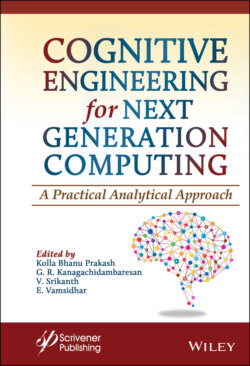Читать книгу Cognitive Engineering for Next Generation Computing - Группа авторов - Страница 11
Оглавление
Preface
Cognitive computing is a hardware and software element which is presently being used mainly in smart system development. Technologies such as artificial intelligence, machine learning, advanced analytics, natural language processing, big data analytics, and distributed computing come under the umbrella of cognitive computing. The impact of this technology can be seen in areas such as healthcare, business, decision-making, personal lives, and many more. Cognitive engineering is commonly used in analysis, design, decision-making, and sociotechnical systems; and cognitive physical systems are used in applications such as human–robot interactions, transport management, industrial automation, healthcare, agriculture, etc. Human individual interactions and group behavior are important to all these applications. Cognitive cyber-physical systems are applied in different areas such as smart manufacturing, agriculture, education, energy management, security, environmental monitoring, transportation systems, process control, smart cities and homes, medical healthcare devices, etc. The increasing complexity of cognitive computing also includes the security problems confronted by such networks. This rise of the Internet of Things (IoT) network complexity is due to too many devices being interconnected with each other through the internet along with the enormous amount of data originating from these devices. Also, novel security issues arise relating to the development of the IoT while conventional security issues become more severe. The major reasons for this are the heterogeneity and the substantially large scale of the objects. As the threats to IoT devices are increasing and the security metrics are based on the developmental aspects of software as well as network, the hackers can expand control and carry out malicious activities and attacks on other devices close to the compromised one. Due to the natural significance of the low-power and low-memory nature of these devices, these devices do not have malware protection or virus protection software. The cognitive approach to the IoT provides connectivity to everyone and everything since IoT connected devices are known to increase rapidly. When the IoT is integrated with cognitive technology, performance is improved, and smart intelligence is obtained. Different types of datasets with structured content are discussed based on cognitive systems. The IoT gathers the information from the real-time datasets through the internet, where the IoT network connects with multiple devices.
This book mainly concentrates on providing the best solutions to existing real-time issues in the cognitive domain. Healthcare-based, cloud-based and smart transportation-based applications in the cognitive domain are addressed. The data integrity and security aspects of the cognitive computing domain are also thoroughly discussed along with validated results.
EditorsKolla Bhanu PrakashG. R. KanagachidambaresanV. SrikanthE. Vamsidhar
